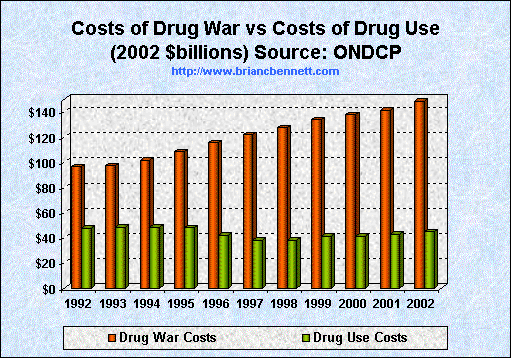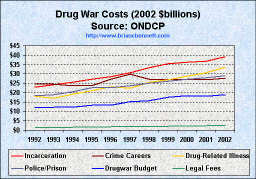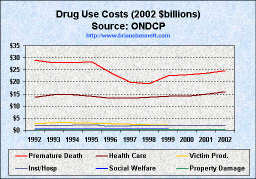Discussion:
From 1992 to 2002:
- - Overall, annual "costs" associated with illegal drug use rose 34 percent
- - Annual drug war costs rose an astounding 53.8 percent, while
- - Annual drug use costs actually fell by 6.3 percent
Of the costs claimed in the ONDCP study, four cost categorization elements alone account for nearly 70% (per year) of the total claimed annual costs of "drug abuse." Those four cost categories are all considered forms of "Lost Productivity":
- Lost Wages Due to Incarceration (21.6% of 2002 total)
- Drug Abuse Related Illness (18.5% of 2002 total)
- Crime Careers (15.3% of 2002 total)
- Premature Death (13.6% of 2002 total)
Lost Wages Due to Incarceration
If you are in jail, it is quite difficult to make money. This cost categorization would simply not exist if we weren't jailing people for "drug" crimes. While the drug czar claims that it doesn't happen that frequently, quite frankly, it is uncivilized to imprison anyone for the acts they chose to commit upon themselves -- and it costs a lot of money to do so.
According to the ONDCP study (p. III-18): "In 2002 there were about 663,000 individuals incarcerated on drug-related offenses: 475,000 for violations of drug laws, and another 190,000 for drug-related property or violent crimes."
Thus, 71.6 percent of this cost is directly attributable solely to the existence of the drug laws themselves, without the involvement of any actual "crimes" having been committed. For 2002, this added up to $28 billion.
Drug Abuse Related Illness
An entirely invented cost (and nearly one fifth of the total), the numbers represent the presumed impact on the health care system caused by the number of people who have used cocaine or marijuana 100 or more times in their lifetime. The "thinking" (as it were) is that surely having used one or even both of these substances at least 100 times over the course of ones lifetime will lead to costly health care related consequences.
This number is still being included in the ONDCP cost estimates, even though the authors of the study themselves stated in the 2001 version that: "changes in the number of individuals using marijuana and cocaine for more than 100 days may not be closely related to drug abuse related illness."
Note: While this explanation was contained in the 2001 version of the ONDCP study, it has been specifically removed from the 2004 study. It remains, however, an entirely invented "cost" even if they fail to admit it.
Crime Careers
This category is supposed to represent the costs of drug dealers and addicts not having regular jobs. If all drugs (instead of just tobacco and alcohol) were regulated the same way, these people would either get regular jobs or continue to commit crimes to maintain their lifestyles. In either case, the cost would not exist in its own right as a separate tangible "cost" of drug abuse if we weren't trying to stop people from using the drugs other than alcohol and tobacco in the first place.
As the ONDCP study describes it, this cost is based on the idea that some 35 percent of "hard core" addicts who use "expensive drugs" (i.e. cocaine and heroin) resort to drug selling, prostitution, theft and other sorts of crimes to support their habits. The drugs are actually only worth a few dollars per gram, but under a prohibition regime, the costs of such substances are grossly exaggerated beyond their actual market value. Thus, this cost is entirely a result of drug prohibition, and not of drug use itself.
Premature Death
This "cost" is the potential lifetime earnings of those who died from drug-related causes. It does not accurately portray the single year "cost" of such deaths, and worse, the ONDCP's calculation includes all "drug-related" deaths, including those from completely legal drugs. Most drug-induced deaths from illegal drugs are caused by using drugs of unknown quality in unknown dosages (accidental overdoses). Were the drugs legal, it is likely that overdose death rates would be much lower, simply because most drug users actually do not want to die. In any event, death by drug accounts for less than 1 percent of annual total deaths.
Bottom Line
It's been 100 years ... drug prohibition doesn't stop people from using drugs. But trying to stop them is costing us at least 3 times as much as the supposed costs of their behavior. Are we just plain stupid, or completely out of our minds? Or, is it, perhaps, that we have simply been misled about such things?
Worst of all, labeling people as criminals and punishing them for doing things to themselves is a "cost to society" that our Founders likely never could have imagined that we would bear. It isn't about drugs -- if it were, than how do we explain our "tolerance" of alcohol and tobacco? Allowing people to be punished over what they do to themselves is costing us a lot more than just money.
|


